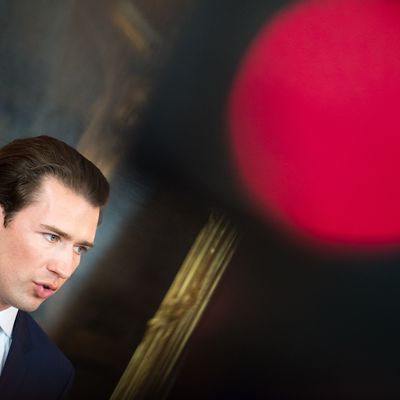
Political norms regarding foreign interference really mean something over in Central Europe. On Saturday, Austrian chancellor Sebastian Kurz dissolved his coalition government after a video emerged of a far-right coalition leader promising government contracts to a Russian woman who alleged she was the niece of an oligarch close to Vladimir Putin.
In the video, recorded in July 2017, the Russian woman says that she hopes to invest €250 million in Austria; Vice-Chancellor Heinz-Christian Strache then mulls over the ways that the money could help his anti-immigration Freedom Party. Over sushi and energy drinks in Ibiza, Strache also suggests that the woman could help his party win the 2017 election and mentions that he has met with Vladimir Putin’s advisers to discuss “strategic collaboration.” The Russian investor also offered to buy a 50 percent stake in an Austrian newspaper in an attempt to provide favorable coverage for the Freedom Party. Strache resigned less than 24 hours after the video was published by German magazine Der Spiegel.
With the Freedom Party leader busted for courting Russian influence, Chancellor Kurz demanded that President Alexander Van der Bellen call a snap election, which will be held in September. “What is important now, and that is the uppermost requirement, is to ascertain a full explanation of what happened,” Kurz said. “We need all the suspicious facts which have arisen as a result of the video to be verified; that naturally concerns themes of potential abuse of power, to questions of potential criminal concern.”
A party leader finds out that a political ally has been toying with alleged Kremlin-linked assets and disbands the ruling coalition — this hasn’t exactly been the response to Russian intrusion into American politics. Rather, the Republican Party has done all it can to elevate the Trump presidency above the rule of law, and declare “case closed” on any further inquiry into Trump’s Russian connections.
There are a few glaring differences between the Austrian and American political crises, although both show the looming threat of Russia’s attempts to widen political divisions in Western democracies. In Vienna, the government is willing and able to promptly call an election to give voters the opportunity to act on the new information on the Freedom Party. Also, the parliamentary system means that the link between Kurz’s People’s Party and the Freedom Party is less iron-clad than the president’s hold over the GOP. This creates a little more political distance in which Kurz can act: On Sunday, he said that there “could be criminal liability” for Strache, depending upon the result of a pending investigation.
Another key difference: At the moment, the scandal in Austria is a one-man show, compared to the vast and knotty tangle of Trump-world figures who were shown to be wrapped up with Russian assets — even if these connections didn’t amount to collusion. The decision for Kurz to give up his party’s ruling coalition for this crisis-of-one shows a major break in the operating policy of the People’s Party and the GOP.
If Strache does end up staring down “criminal liability,” it would show the greatest difference between these two case studies in Russian interference. Strache, the leader of his far-right populist party, went directly to the source, unlike President Trump, who relied on a system of middlemen — and sons and lawyers — to pursue his Russian interests. If the house that Trump built has been compared to a crime family, the fall of Heinz-Christian Strache shows why the president cared to act through intermediaries and muddied directives.






























